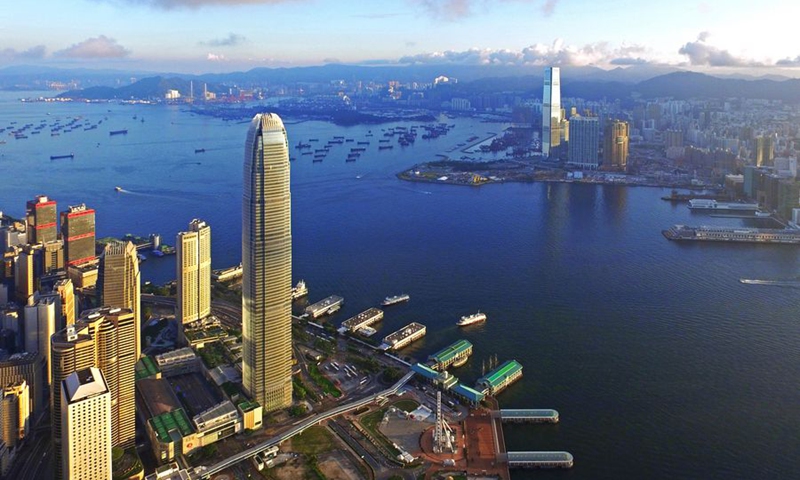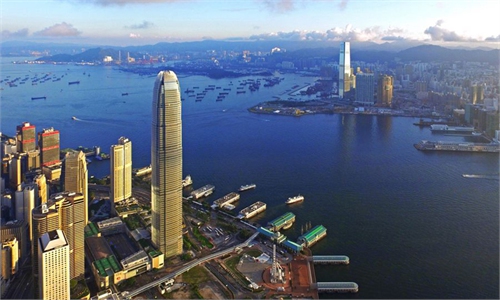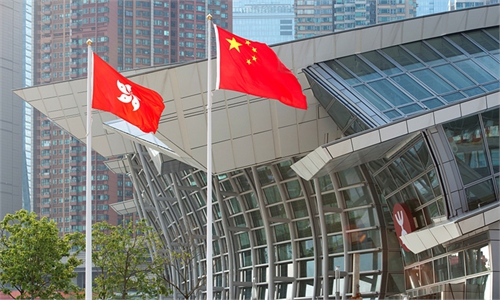HK's global financial hub elevated under national security law - not ended as claimed
National security law, closer bonds with mainland lift status

Aerial photo taken on April 30, 2018 shows the Victoria Harbor in south China's Hong Kong. Photo: Xinhua
Editor's note:
As the national security law for Hong Kong is set to mark the first anniversary of its implementation on June 30, the Global Times is publishing a series of articles to debunk assertions by Western anti-China forces that the move would seriously undermine the city's economy. This is the first part of the series focusing on Western claims of the end of the city's global financial center status.
One year after the national security law for the Hong Kong Special Administrative Region (HKSAR) took effect, the city's status as a global financial hub hasn't faded, contrary to ill-founded assertions by anti-China forces that the law threatened such a status, observers said, pointing to stellar market data and the HKSAR's closer bonds with the Chinese mainland.
Wednesday will mark the first anniversary of the adoption of the national security law, which was aimed at addressing long-standing national security risks in the HKSAR. But the law became a target of constant slander and attacks from anti-China politicians and media outlets in the US and some other Western countries, which made fear-mongering claims such as "the end of Hong Kong's status as a global financial hub."
However, market data and observers paint a completely different picture of the city's financial sector over the past year from those rather dire claims.
As of the market close on Friday, Hong Kong's Hang Seng Index gained nearly 20 percent since July 1, 2020, the first trading day after the law took effect.
More than HK$400 billion ($51.54 billion) in funds had been raised in the Hong Kong market through IPOs last year, an increase of over 27 percent year-on-year, according to official data.
In the first five months of the year, the Hong Kong stock exchange raised some HK$183.9 billion in funds through new share offerings.
"Hong Kong's status as a world financial hub has been stable, or has even been enhanced, after the national security law was implemented in the city," Zhao Qingming, a Beijing-based veteran financial expert, told the Global Times on Sunday.
Zhao noted that some Chinese companies have sought secondary listings in Hong Kong amid the US crackdown on Chinese firms, which in turn prompted a lot of capital to shift away from the US markets to Hong Kong.
Thomas Yeung, vice dean of the Futian School of Finance and an economist in Hong Kong, also said that Hong Kong's role as a global financial hub has not been swayed in the past year.
"There's been no massive outflow of capital from Hong Kong. The number of overseas and mainland companies' regional headquarters in Hong Kong has remained stable at around 1500 last year, and overseas financial companies' investment in Hong Kong has been active, considering that some investment banks are hiring new employees and buying land in Hong Kong," Yeung told the Global Times on Sunday.
The Hong Kong Monetary Authority also said in its half-yearly monetary and financial stability report in March that "from a cross-border perspective, there has been no sign of significant outflows from the Hong Kong banking system as total deposits increased."
The report added that "non-residents' direct investment inflows into Hong Kong continued in the fourth quarter of 2020, and did not show any abnormal flow pattern."
In its latest financial system stability assessment with the HKSAR earlier this year, the IMF said that the city's banking sector remains "well capitalized, profitable, and nonperforming loan ratios remain low, while its exchange rate mechanism has continued to support financial stability and is underpinned by large foreign exchange reserves."
The HKSAR's ever-growing integration with the mainland is also seen as defending the city against its global competitors, especially considering the HKSAR's role in the 14th Five-Year Plan (2021-25).
With the five-year plan endorsing Hong Kong's status as a global financial hub, as well as an international center for offshore yuan business, asset management and risk management, the city, gearing up for expanded mutual access between its financial markets and those of the mainland, is poised to become more appealing to both domestic and foreign investors, analysts said.
The scale of Hong Kong-mainland financial connectivity mechanisms is also increasing, such as the expected expansion of the bond link program, Zhao said, stressing that those mechanisms will create a "virtuous cycle" and Hong Kong's financial hub role will be reinforced further.
In another sign of progress, pre-revenue, pre-profit biotechnology start-ups floated under the HKEX's new listing regime have recently been added to southbound trading of the stock connects linking Hong Kong and mainland bourses.
The Wealth Management Connect, devised to enable mainland investors from the Greater Bay Area to make direct purchases of cross-border financial products in Hong Kong is also around the corner in a milestone for the country's capital account liberalization.
Moreover, as Yeung put it, with the integration of the mainland and the HKSAR, many mainland students have opted for Hong Kong as a destination for receiving financial education or training, surely expanding the city's talent pool.



